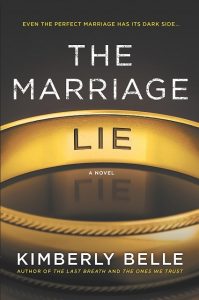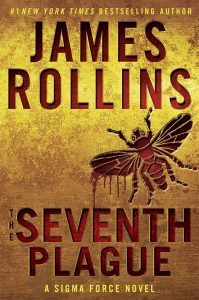Kimberly Belle’s previous novels are The Last Breath and The Ones We Trust. She holds a bachelor of arts degree from Agnes Scott College.
Her third novel, The Marriage Lie, begins with the depiction of Iris and Will’s marriage as a blissful union. They both have rewa rding careers and have decided to try for their first baby. On the morning Will leaves on a business trip to Orlando, Iris learns a plane headed for Seattle has crashed, killing all on board. According to the airline, Will was on that plane. Stunned, Iris seeks answers about why Will was going to Seattle, not Orlando. A series of secrets and lies emerges, and Iris’ life is changed forever.
rding careers and have decided to try for their first baby. On the morning Will leaves on a business trip to Orlando, Iris learns a plane headed for Seattle has crashed, killing all on board. According to the airline, Will was on that plane. Stunned, Iris seeks answers about why Will was going to Seattle, not Orlando. A series of secrets and lies emerges, and Iris’ life is changed forever.
The Marriage Lie depicts a marriage beset by secrets. How did this idea come to you?
I love writing about secrets because, when they are revealed, as they always are, they can disrupt a relationship. One of my children lives in Holland, so my husband and I are back-and-forth all the time. When I began thinking about my next story, flying and plane crashes were at the forefront of my mind. I began thinking what a plane crash is like for the people left behind, especially if some sort of deception was involved as happens in The Marriage Lie.
What about secrets intrigues you?
I love writing about suspenseful issues and using that tension in a plotline. But the meat of my story is the relationship between Iris and Will, and how the discovery of certain secrets impacts their relationship. The intrigue for me is what happens to a relationship when people find out about the other person’s secrets.
Speaking of relationships, tell our readers about Iris’ and Will’s relationship and the issue of accountability for one’s past.
Iris and Will are very much in love and seem to have it all. As a student counselor, Iris always talks to her students about being accountable for what they do. When Will goes missing and certain questions arise, Iris wants to know the truth about him. When she learns the truth, she must re-evaluate everything in the relationship—not just things moving forward, but everything that has gone on before Will disappeared. She thought she knew her husband, but didn’t know him at all.
The Marriage Lie depicts Will as having changed completely by the time he and Iris marry. Do you believe people ever truly change?
I think people can want to change, but I haven’t met anyone who has completely changed. I think Will wanted to change and become a better man for Iris, but in the end, I don’t think he achieved that sort of encompassing goal.
The Marriage Lie is written in the first person, present tense. What made you choose that format?
I’ve tried other formats, but that’s just the way my voice works best. When it comes time for me to sit down and write, that’s the best way for me to get inside my characters’ heads. I love the immediacy of the first-person narrative, and of the present tense. The action is happening right then and there in front of the reader.
What’s the most important lesson you feel you’ve learned about writing?
There are two. The first is that every book you write is different. When I think I’ve finally figured out writing—how to structure a novel or create characters—I come up with another story that needs to be told differently, and in a way, that makes me feel I haven’t learned anything. [Laughter] It’s humbling and frustrating. Maybe that’s what keeps writers on their toes.
The other lesson is I must show up every single day at my computer. If there are no words, there’s no story.
What has surprised you about the writing life?
First, I’ve been so positively surprised by how supportive other writers are. It’s competitive, for sure, but I’ve been so pleasantly surprised by how willing other authors are to tweet and help me promote my books.
Another surprise has been how long it took me to figure out that writing is what I’ve wanted to do. I love doing it so much, I wish I’d discovered it earlier.
If you weren’t a writer, what would you be doing today?
This is my second career. Previously, I worked in fundraising for non-profit organizations. I’m still passionate and active about certain causes, so I’d probably still be working in that field if I weren’t writing.
If you could experience reading one novel again as though reading it for the first time, which one would it be?
There are so many I’ve loved. One that surprised me in unexpected ways was The Book Thief. It’s completely out of my genre, but every page had a sentence or phrase that floored me.
What’s coming next from Kimberly Belle?
I’m working on a story about a botched kidnapping. The kidnapper snatches the wrong child and the blunder pits both mothers in a race against time to save the boy. To do that, they’ll have to take a closer look at the people around them. The working title is Mistaken.
Congratulations on writing The Marriage Lie, a suspenseful, multilayered and gripping novel that had me turning the pages until late into the night.








